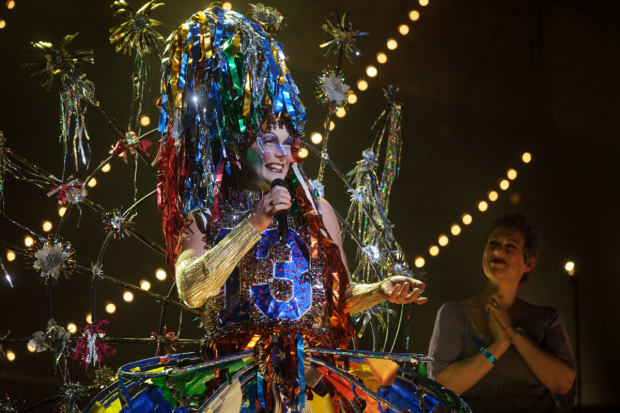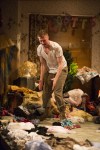Review: Taylor Mac: A 24-Decade History of Popular Music: The First Act (Barbican)
The American performance artist and drag act Taylor Mac performs the first section of his 24-hour piece in London

© Sarah Walker
At the end of 2016, a month before a divided America elected Donald Trump, Taylor Mac took to the stage at St Ann's Warehouse in New York. Over 24 hours, the protean performance artist, who identifies as 'judy', galloped through a nation's history in song. A marathon that kicked off with military marches from 1776 and the Patriots' Revolution surged on through the centuries, past civil wars and civil unrest, past slavery and Stonewall, Gershwin, Sinatra, Springsteen and on. Each hour, a decade; 246 songs to sum up the States. "It was AMAZING", Mac tells us in London. "You missed it."
We did, and for now, we must settle for the first three hours of this epic event. Mac plans – promises – to do another every other year: "This is durational," judy insists. It's just that the cycle will take 16 years. Should anyone need a reason to stay alive, that's one right there.
Beginning like something shot out of a human confetti canon – festooned in tinsel and a bedraggled bunting hooped skirt – Mac opens like an excitable adolescent; a country come of age. Backed by a 24-strong local orchestra, judy launches into a cycle of soldierly songs and, within the hour, we're all hollering along, full-blast, to "Yankee Doodle Dandy" – "A song that makes fun of effeminate men", Mac points out. "I'm not exactly an unironic patriot…"
This is the healing ceremony America needs: "a radical faerie ritual sacrifice", to use judy's own words. A 24-Decade History reaches back to the roots of America and finds a nation supposedly founded in freedom has fostered division. Capitalism pits us against one another, democracy squashes otherness under the majority's heel. Here Mac makes space for it, speaks and stands up for it. Judy invites Native American Timothy White Eagle to address the room, leads an all-female sing-a-long of old Women's Lib anthems and, helped by a chorus of Dandy Minions and guest performers, summons a spirit of radical, open-armed queerness into the room. Judy brings an audience together, welcoming all comers into a joyous congregation.
Mac's so much more than a drag act. Onstage, judy transcends gender to become unworldly, iconic and divine. It's almost shamanistic: Mac's white face, flecked with colour, contorts like a mask: serene, scornful, flirtatious, tongue firmly in cheek. In Machine Dazzle's wildly exuberant, outrageous costumes, Mac looms large. The effect eggs us on, whipping up such a frenzy that we forget ourselves and surrender and, a show that starts with a mass shake-out – a minute's talking in tongues, arms in the air – soon has people clambering over the seating, chasing naked bodies this way and that, and spitting ping-pong balls into strangers' mouths. Mac fosters togetherness like nothing I've ever known – and, boy, does the world need that right now.
In a sense, the songs are secondary – just a framework for Mac to do judy's thing. Hour two brings a huge apple pie headdress and a skirt made of shrunken heads, a ramble about women fighting over men and a collective rendition of a repurposed "God Save the Queen". Hour three – a decade's worth of drinking songs to see the 18th century out – needs a champagne cork wig and a whole load of fizz. Beers get passed round, a temperance choir draws tuts, and Mac's hoisted aloft in skimpies and stilettos like some party spirit send from above. It's just marvellous: one hell of a hootenanny.
Each hour follows a formula: songs, stories and a smattering of sociological theory, guests that share Mac's stage and some kind of audience participatory game. Again and again, Mac splits us in two to play together: as Americans mock bayoneting the Brits in our midst, women singing to men, drunken pukers and sober comforters stroking their hair. The sheer force of Mac's personality is flat-out unstoppable.
Inevitably, three hours falls short of full whack. It's its own thing – an uplifting blast of unadulterated joy – but nonetheless, it still feels frustratingly incomplete: the first scene of the greatest Hamlet in history. You spot the scheme without sitting through it for yourself, and there's no sense of survival, no sticking something out. Act one stops short: a snapshot of an era via a selection of old, unfamiliar songs, rather than the feeling of history unfolding, unstoppably, unthinkingly, towards us. Each hour, a musician departs; the score thinning out until Mac's left alone at the end of a long day – but none of that really register. Each hour, judy dishevels too, falling out of one elaborate, crumpling costume before redressing anew. That's capitalism, baby. And pop music, too. Out with the old and in with the new.
And yet, the three hours are so giddy, so delirious, such fun, I could happily have sat through another 21. It's a mark of Mac's genius that, after three hours that fly by, you only want more. Right now, we need more.


















